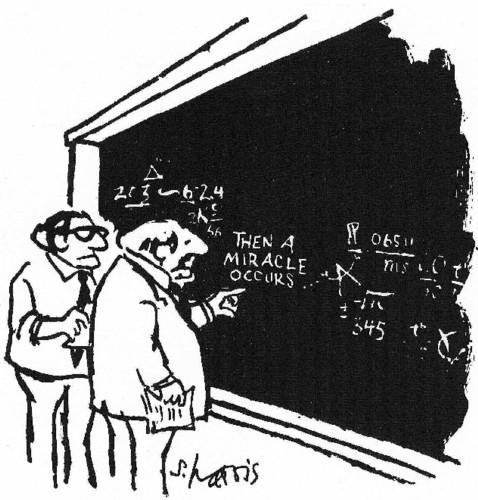
"I think you should be more explicit here in step two."
(Source)
Let's Adore Jesus-Eucharist! | Home >> Philosophy

"I think you should be more explicit here in step two."
(Source)
What is "religion", singular? Is it possible to make even just one true statement about "religion", singular?
The expression "religion" is sometimes a figure of speech called "synecdoche", whereby we take the name of the whole (the set of all religions) to signify one single religion (for example, the Catholic religion). In that case, that word has a precise meaning. On the other hand, the scientist who uses that expression should forget figures of speech and just say the precise name of the religion he's talking about!
But in my debates with Atheists, the word "religion" singular doesn't normally have that meaning for them. They say "religion" singular, as if it was obvious to all that such a concept was precise. They say "religion" as if there was a subset of characteristics that all religions had in common. Are they right?
In order to find out, we'd need to make a big matrix, with, in the columns, all possible religions, then in the rows, all possible characteristics of those religions. Then, for each religion, we'd need to put a checkmark next to all characteristics it has. Finally, we'd need to group all the rows that have checkmarks everywhere, i.e. determine the subset of characteristics that all religions have in common.
If you think you've got a chart showing the characteristics common to all religions, please call the university closest to you. You'll probably get a Nobel prize!
Think about a few characteristics. For example, "a personal God". Catholicism: check. Islam: check. Greek mythology: several gods, not one only! Buddhism: hum, not easy. As far as I know, Buddhism doesn't have the concept of a personal God.
Let's take another characteristic: a "system of beliefs". Catholicism: check. Islam: check. Nazism: oops, check too! (Nazis certainly didn't have scientific proofs to support their claim that Jews were sub-human, so it was a belief.) Experimental science: oops, often a checkmark here too! (A scientist who does experimental science must for example use his eyes to count the red blood cells on a microsope's slide. But who says his eyes aren't deceiving him? Rare are the scientists who have studied Criteriology in Metaphysics. Most of them are content to believe in common sense.)
Let's take another characteristic: a "moral code". Catholicism: check. Islam: check. Atheists: check! Oops, Atheists aren't supposed to have a religion! But I've never met an Atheist who publicly claimed he had no moral code. (Worse, I've never met an Atheist who could show me the rational basis of his moral code, but that's another story.)
But wait, it gets worse! Are you able to find me a list of all religions? Good luck! And that is just for currently existing religions! But there have been many more religions! (Think of the Romans, where each village had its god, or think of the Natives here in Canada, where each tribe seems to have had its own religion, etc.)
But wait, it gets worse! Can anybody start up a religion, right now as we are speaking? Sure! And can a religion disappear anytime? Sure! Not easy to make a list, when items on that list constantly pop in and out of existence!
But wait, it gets worse! Are there rules, limits, guidelines to be respected when the beliefs of a new religion are decided? Not at all! In other words, not only is it practically impossible to establish the columns of your matrix (all the religions), but it's also impossible to establish the rows (all the possible characteristics)!
If I were an Atheist, I would avoid using the expression "religion" singular. I would say: "religions" plural, or "Catholicism" singular. At least, I would then have the possibility of making a scientific assertion, without requiring a linguistic miracle!
Let's Adore Jesus-Eucharist! | Home >> Philosophy